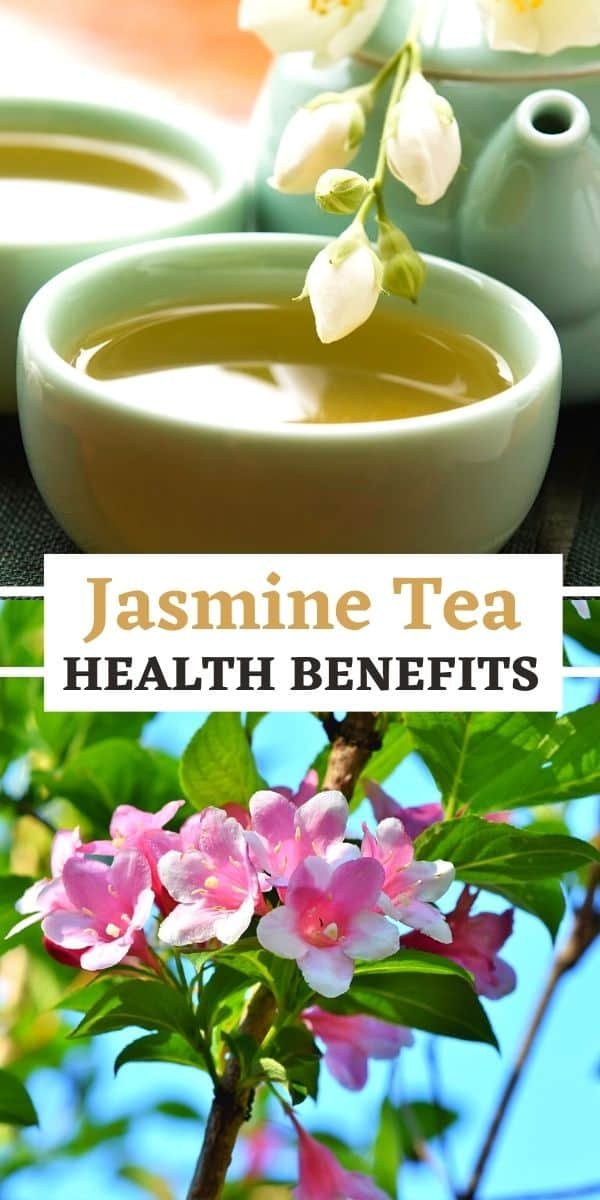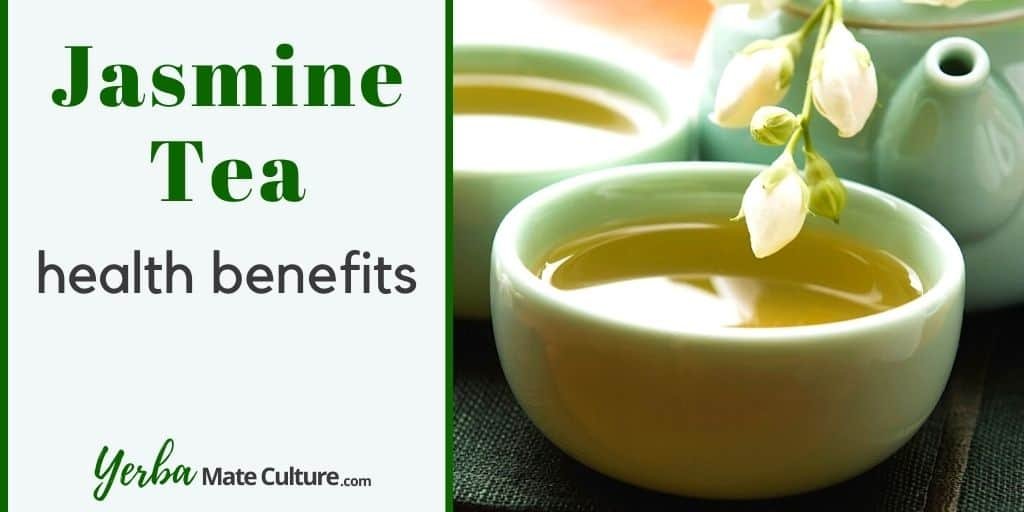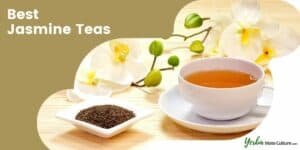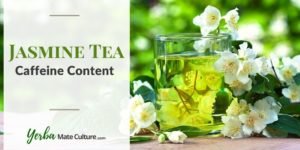Jasmine tea is popular worldwide for its pleasant aroma and it is one of the most consumed tea beverages alongside green tea, black tea, white tea, and chamomile tea. Although tea drinkers enjoy the natural taste and exotic fragrance, it is often the jasmine tea benefits they are mostly after.
I was impressed the first time I drank high-quality jasmine tea and decided to research the potential health benefits.
Jasmine is a natural herb rich in antioxidants and has a long history of medicinal use. Interestingly, there is evidence supporting its positive effects on both physical and mental health.
What Is Jasmine Tea?
Jasmine tea is any tea that gets its flavor or scent from jasmine flowers or blossoms.
Common jasmine (Jasminum officinale) or sampaguita (Jasminum sambac) are usually harvested and placed alongside green or white tea leaves and stored. The leaves absorb the aromas and flavors from the fresh or dried flowers during storage. The finished product is jasmine green tea or jasmine white tea.
The scenting ritual is repeated several times to produce tea with a precise taste. Blending jasmine with other teas seems to help enhance jasmine’s healing powers.
There is also pure jasmine herbal tea made only from the flower petals or full blossoms. Pure jasmine tea is caffeine-free.
About the Jasmine Plant
Jasmine, also known as the “Queen of Flowers,” is a member of the olive family and has over 200 species. Jasmine (Jasminum officinale) and Sampaguita (Jasminum sambac) are two common species used to flavor commercial teas. Common jasmine has star-shaped white flowers that produce an intense fragrance.
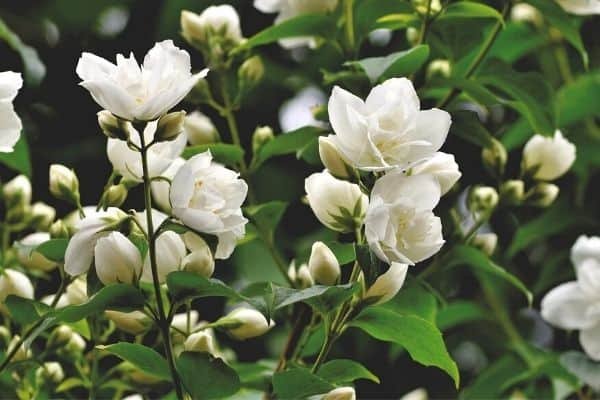
The ancient plant grows well in warm climates and is believed to originate in Asia. You’ll find it in countries like Afghanistan, Iran, China, Japan, Taiwan, India, and Nepal. The deciduous, vine-like herb is also cultivated in parts of Europe, the West Indies, and Florida.
Jasmine Active Compounds
Studies on Jasminum officinale revealed that the plant has antimicrobial, antioxidant, dermatological, insecticidal, and antifertility effects. The most powerful antioxidants found in jasmine tea are catechins.
Jasmine flower also contains a range of phytochemicals including coumarins, cardiac glycosides, flavonoids, phenolics, saponins, essential oils, steroids, alkaloids, and tannins.
Jasmine Tea Origin
The origin of jasmine tea is not quite clear. Some believe it originated elsewhere but became famous during China’s Ming dynasty (1368-1644). Others claim the plant was imported into China from eastern South Asia via India during the Han Dynasty (206 BC to 220 AD).
History of Medical Use
Cultures practicing folk medicine capitalized on the medicinal compounds to relieve ailments such as fever, abdominal pain, diarrhea, infections, and breast cancer. Some use jasmine to calm the nerve, relieve menstrual pain, enhance sex drive, reduce toothache, and lose weight.
Most Common Types of Jasmine Tea
These are the three most common jasmine-flavored teas you can find online or at your neighborhood health store:
- Pure Jasmine Flower Tea
- Jasmine Green Tea
- Jasmine White Tea
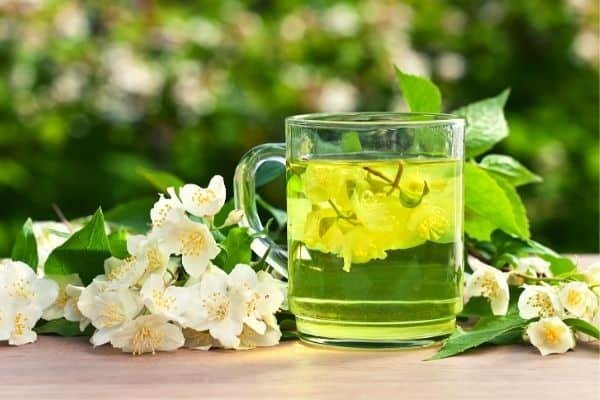
There are also jasmine oolong and jasmine black teas as well as jasmine combined with other plants to make an exotic herbal tisane.
Jasmine green teas are made with different grades of green tea leaves. A higher ratio of jasmine buds to tea leaves is used to make jasmine-scented teas that are highly fragrant but delicate in taste.
Jasmine Tea Taste
The taste will vary depending on if you brewed yourself pure jasmine herbal tea, jasmine green tea, or jasmine white tea.
How the tea is processed also affects its taste. Some variations have a strong floral taste while others have a delicate flavor.
For example, one jasmine tea may have a sweet floral scent and flavor while another carries a light, refreshing taste with a hint of natural perfume aroma.
Choosing the right blend will likely come down to the preference of your tastebuds.
Pure Jasmine Flower Tea Benefits
Herbal teas or tisanes made from pure jasmine blossoms can help in the following ways:
Combat Digestive Problems: Evidence from studies show jasmine oil has the ability to kill harmful bacteria and may kill E.coli in the digestive tract known to cause stomach pain, vomiting, and diarrhea. As an antispasmodic, jasmine tea may relieve stomach cramps and improve gastrointestinal health.
Fight Depression/Anxiety: Scientists suggest that jasmine could be a medication alternative for anxiety and depression. Studies on the flower’s effect on the brain stem from its use in folk medicine for stress, nervous exhaustion, and depression. Jasmine’s fragrance has sedative or depressant effects that may relieve anxiety and improve mood by acting on a brain neurotransmitter for your central nervous system called Gamma-aminobutyric acid (GABA).
Prevent Cancer: Jasmine is bursting with antioxidants that may help prevent cancer. Antioxidants go after free radicals in the body that damage the DNA of healthy cells, thereby increasing the risk of cancer.
Boost Immunity: Jasmine’s potential ability to boost immune health comes from the anti-inflammatory and antioxidant compounds it contains. The herb can scavenge free radicals linked to inflammation production in the body and protect against opportunistic infections or illness.
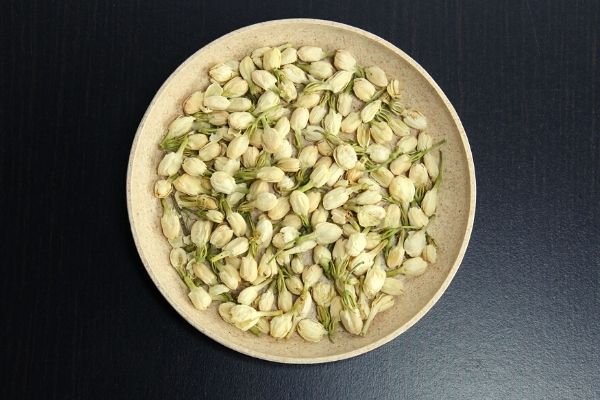
Jasmine Green and White Tea Benefits
Both green tea and white tea have antioxidants and a range of polyphenol compounds. Jasmine and green tea are high in catechins, a group of polyphenols packed with antioxidants. White tea has high levels of theaflavins.
The most notable antioxidants found in jasmine tea are catechins. Antioxidants play a crucial role in preventing certain diseases. When blended with jasmine, green and white teas help enhance jasmine tea’s benefits and vice versa.
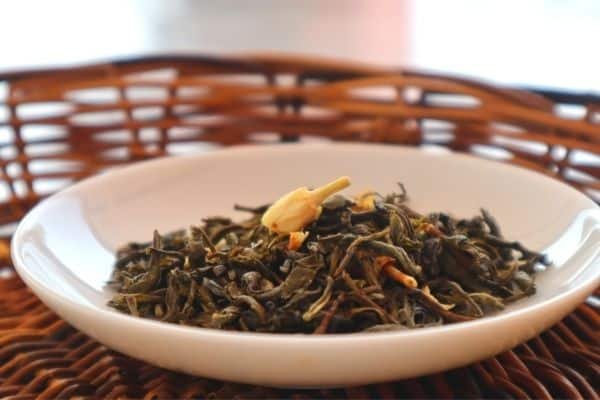
1. Helps With Losing Weight
The chemical compounds in jasmine have the ability to help you lose weight by speeding up your metabolism The green tea base can help increase energy loss by 4-5% and fat burning by 10-16%. The fat-burning abilities of jasmine scented tea come from the caffeine and the polyphenol epigallocatechin gallate (EGCG) it contains.
2. Good for Cardiovascular Health
Jasmine scented white or green tea may be good if you’re looking to adopt a heart-healthy lifestyle.
Studies find the polyphenol compounds may help prevent heart disease by stopping LDL (bad) cholesterol from sticking to your artery walls and forming plaques. Your arteries can become clogged over time leading to reduced blood flow and oxygen to your heart. This raises the risk of chest pain (angina), heart attacks, and stroke.
3. Increases Energy Levels
The natural caffeine in green and white tea scented with jasmine acts as a stimulant in the body. This is one reason why caffeine is one of the most consumed stimulants in sports. Caffeine wakes up the brain, boosts energy levels, and may increase physical performance and productivity.
4. Good for Skin
Jasmine blossoms have antibacterial properties and antioxidants that can promote healthy skin. The antioxidants and polyphenols get rid of free radicals that contribute to skin damage and premature wrinkles.
Many people also use jasmine essential oils on skin wounds or scars. Studies find that the essential oils of jasmine can counteract aging, dry complexion, and inflammatory skin conditions such as psoriasis.
5. Boosts Cognitive Function
Jasmine green and white teas contain caffeine and L-theanine, which may help increase alertness and improve short-term memory. Caffeine boosts energy and alertness by stimulating your nervous system and increasing brain activity. Theanine helps put you in a good mood.
6. Helps Prevent Alzheimer’s and Parkinson’s Disease
Alzheimer’s and Parkinson’s disease are two brain diseases that stem from a progressive build-up of certain proteins in the brain and damage to brain cells. The tea’s powerful polyphenol EGCG may suppress the formation of inflammation and neutralize free radicals that damage brain cells.
7. May Reduce the Risk of Cancer
The high levels of antioxidants in jasmine tea may help fight against cancer by reducing cell damage caused by free radicals. In particular, green tea polyphenol (GTP) may kill cancer cells or prevent them from growing and spreading.
One study suggests that green tea has anticancer effects on bladder cancer. Green tea catechins and anticancer agents may also lower the risk of colon cancer.
8. Can Boost Immunity
Your immune system acts as a defense against infectious bacteria and other harmful microorganisms that cause diseases.
Green and white tea-based jasmine teas have anti-inflammatory and antioxidant properties that can strengthen the immune system. They prevent harmful agents from lowering your immune system’s ability to fight off illnesses and chronic diseases such as inflammatory arthritis.
9. May Improve Oral Health
Antioxidants and antibacterial agents found in jasmine green tea, in particular, may improve oral health by protecting against tooth decay.
According to one study, green tea catechins prevent plaque (a sticky film of bacteria) from forming on your teeth. Oral bacteria produce an acid that causes cavities. Additionally, the tea may fight bad breath by reducing odor-causing bacteria in the mouth.
Jasmine Tea Side Effects
Pure jasmine tea is healthy and generally safe. It’s made from natural flowers and is caffeine-free.
To reap the benefits, you may need to drink 2-3 cups of tea per day.
However, studies on Jasminum Officinale are limited and mostly involved animal subjects. Researchers currently do not know if it will adversely interact with other herbs, medications, or supplements you’re taking.
The caffeine in jasmine green tea and white tea may cause side effects in some people. High levels of catechins may increase the risk of iron deficiency anemia. Further, the tea’s acidic content may cause stomach irritation.
Despite the therapeutic benefits, jasmine is not recommended for use during pregnancy due to its potential to cause premature contractions.
How to Brew Jasmine Tea
Preparing a cup of healthy and delicious jasmine tea is easy. Yet, for the best result, you need to consider what type of jasmine tea you are making.
How to Make Pure Jasmine Flower Tea
- Use about 1 to 2 teaspoons of dried jasmine flowers per one cup of tea.
- Heat water to about 195 °F (90 °C).
- Add the jasmine flowers and water to a teapot (or another tea vessel), cover, and let it steep for 3 to 5 minutes.
- Strain into tea cups and enjoy!
How to Make Jasmine Green Tea
The process for brewing jasmine green tea is very similar to the one described above. The main difference is that you should water that is about 170-180 °F (77-82 °C) and steep it for 1 to 3 minutes.
The best brewing temperature and time depend on the type of green tea you have. Experiment to find the best result for your preference.
You can also try this delicious jasmine milk tea recipe.
How to Make Jasmine White Tea
Use the same method as for jasmine green tea, except the brewing temperature should be slightly lower, about 160-170 °F (717-77 °C).
I also recommend that you check out my guide with the best jasmine tea brands.
Taste the Natural Benefits of Jasmine Tea
Sipping freshly-brewed jasmine tea and inhaling the sweet perfumed aroma can be a gracious start to your day. Pure jasmine tea or blends of jasmine and green tea or white tea are available online or at your local herbal store.
If you are pregnant, breastfeeding, or on any kind of medication, remember to speak with your doctor or healthcare provider before supplementing your diet with jasmine.
Jasmine Tea FAQ
How does Jasmine tea taste like?
The taste depends on what kind of jasmine tea you have. Pure jasmine flower tea, jasmine green tea, and jasmine white tea all have different taste. In addition, jasmine green and white teas have several different varieties. Pure jasmine herbal tea has a mild floral taste while jasmine green tea has a more vegetal and slightly sweet taste.
Does Jasmine tea have caffeine?
Pure jasmine flower tea does not contain any caffeine. Jasmine green and jasmine white tea do contain anything between 15 and 60 mg of caffeine per cup.
Does Jasmine tea have any side effects?
There are no known side effects of pure jasmine flower tea. Jasmine green and jasmine white tea contain caffeine which can cause side effects such as nausea, palpitations, or poor sleep if consumed in excessive amounts. They may also increase the risk of iron deficiency anemia and cause stomach irritation.
Is Jasmine tea good for weight loss?
Jasmine green and white tea can help with losing weight and burning fat because they contain caffeine and the epigallocatechin gallate (EGCG), a catechin known to increase fat-oxidation when combined with caffeine.
Enjoy your delicious Jasmine Tea!
-Joonas
Share on Pinterest: |
